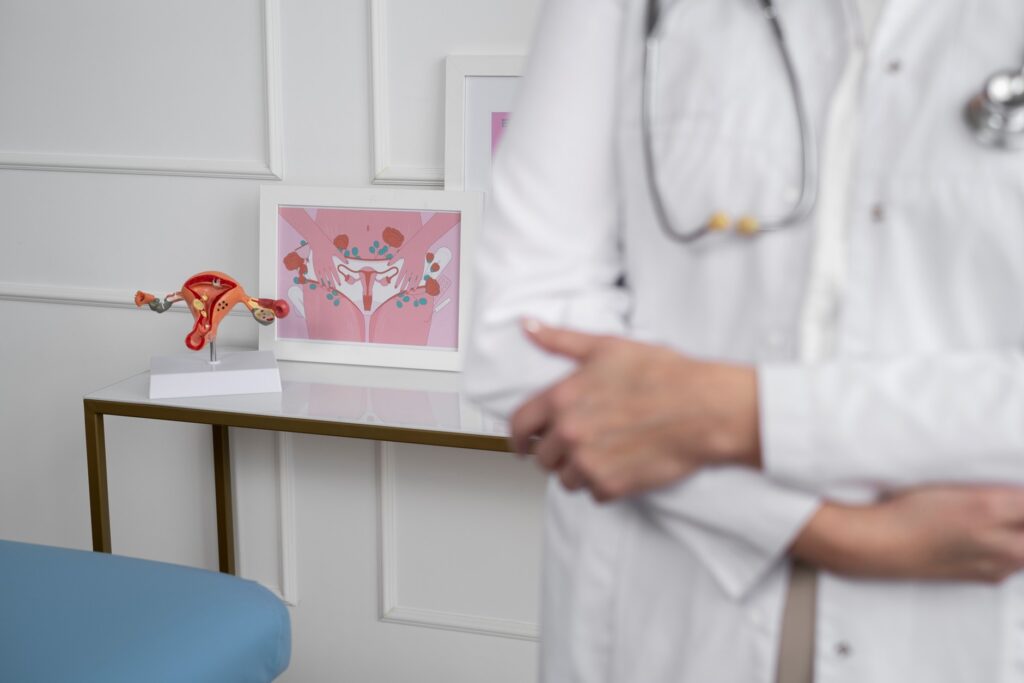Introduction
Endometrial hyperplasia is a condition where the lining of the uterus, called the endometrium, becomes too thick. This thickening happens when there is an imbalance of hormones, especially estrogen and progesterone. Because endometrial hyperplasia can sometimes lead to uterine cancer, it is important to know its symptoms and how to manage it. Understanding this condition helps you take steps to protect your health.
Symptoms
Recognizing endometrial hyperplasia symptoms early can help you get the right care. Although some women may not notice any signs, many experience changes in their menstrual cycle. For example, you may see:Heavy or long periodsBleeding between periodsShorter or longer cycles than usualBleeding after menopause
If you notice any unusual bleeding, it is important to talk to your doctor. Early action can make a big difference.
Causes and Risk Factors
Endometrial hyperplasia often develops when the body has too much estrogen and not enough progesterone. Several factors can increase your risk. For instance, you may be at higher risk if you:Are over age 35Have never been pregnantAre overweight or obeseHave polycystic ovary syndrome (PCOS)Take estrogen-only hormone therapyHave diabetesHave a family history of uterine cancer
In addition, women who smoke or have certain health conditions may also be at risk. Knowing these risk factors can help you and your doctor make informed choices.
Diagnosis
Doctors use several methods to diagnose endometrial hyperplasia. First, your doctor will ask about your symptoms and medical history. Then, they may perform a pelvic exam. To confirm the diagnosis, your doctor may suggest:Ultrasound to check the thickness of the uterine liningEndometrial biopsy, where a small tissue sample is takenDilation and curettage (D&C), a minor procedure to collect more tissue
These tests help your doctor find out if you have endometrial hyperplasia and what type it is. According to the CDC, early diagnosis can improve treatment outcomes.
Treatment Options
Treatment for endometrial hyperplasia depends on the type and your risk of cancer. Your doctor may recommend:Hormone therapy, such as progestin pills or an intrauterine device (IUD)Regular follow-up exams and ultrasoundsSurgery, such as a hysterectomy, in severe cases or if cancer is found
Most women respond well to hormone therapy. However, it is important to follow your doctor’s advice and attend all follow-up visits. The right treatment can lower your risk of cancer and help you feel better.
Prevention Tips
While not all cases can be prevented, you can lower your risk of endometrial hyperplasia by making healthy choices. Here are some tips on how to prevent endometrial hyperplasia:Maintain a healthy weightExercise regularlyManage health conditions like diabetesDiscuss hormone therapy options with your doctorReport any unusual bleeding right away
By following these steps, you can help protect your uterine health.
Lifestyle Guidance
Healthy habits can support your overall well-being and reduce your risk. For example, you can:Eat a balanced diet rich in fruits, vegetables, and whole grainsLimit processed foods and sugary drinksStay active with daily walks or other exercisesAvoid smoking and limit alcohol useKeep regular check-ups with your gynecologist
These lifestyle changes can make a big difference in your health.
When to See a Doctor
It is important to see a doctor if you notice any of these signs:Unusual or heavy bleedingBleeding after menopausePain in your lower bellyAny sudden changes in your periods
Early medical care can help find problems before they become serious. In many cases, quick action leads to better results.
If you have questions or concerns about endometrial hyperplasia, consult a gynecologist for personalized advice.

